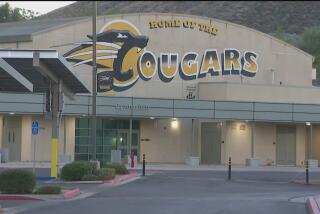1986 Murder in Dark Lot Spurs Campus Lighting Bill
- Share via
LAGUNA BEACH — On a cold January night in 1986, student disc jockey Robbin Brandley was walking to her car in an unlit parking lot on the Saddleback College campus in Mission Viejo when she was attacked.
The body of the 23-year-old Laguna Beach woman, a communications major who had looked forward to a career in broadcasting, was found several hours later next to her car. She had been stabbed repeatedly. There was no evidence of sexual assault or robbery and the case was never solved.
On Wednesday, after recently being contacted by the young woman’s parents, state Sen. Marian Bergeson (R-Newport Beach) introduced legislation to require lighting on all public campuses in California.
Citing a rise in crime on the nation’s college campuses, Bergeson said the increased lighting would act as a deterrent. Brandley’s mother, Genelle Reilley , said lights in the Saddleback parking lot four years ago might have saved her daughter’s life.
“It’s too late for our daughter, but we don’t want this to happen to anyone else’s child or grandchild,” Reilley, 51, said at her Laguna Beach home Wednesday. “We want to do everything we can to protect our children on these campuses.”
Reilley and her husband, John, also 51, a Ralston-Purina executive, approached Bergeson last December about the possibility of enhancing campus security with more lighting. Upon looking into the issue, Bergeson said in a statement Wednesday, she found that no lighting standards existed on California campuses. Schools, she said, look to the state architect’s office for lighting recommendations.
“This bill will give the state architect an adequate standard which will guarantee a minimum average of two foot-candles (a unit of measuring illumination) at the pavement throughout the parking or walkway surface,” Bergeson said. “(The bill) will effectively double the amount of light available to most school lots.”
Bergeson noted that, in recent years, campus crime in California and across the nation has been on the rise. Reilley said Saddleback College has been at particularly high risk because of its location amid hills where shrubbery can conceal an attacker.
The year before Brandley’s death, another Saddleback student was attacked on campus. In April, 1985, a 25-year-old student was abducted from a different parking lot by two men who beat her over the head, stripped her, then dumped her naked, but alive, about six hours later on a freeway off-ramp. Since Brandley’s death, at least three other women have reported being sexually assaulted there.
On the night she was attacked, Brandley--a student disc jockey for KSBR-FM--served as a volunteer usher for a piano concert and reception at the school’s Doyle G. McKinney Theatre. She was returning to her car, about 100 yards from the theatre, when the attack occurred.
Ever since, John and Genelle Reilley have sought to assuage their pain over their daughter’s murder by pushing for campus security reforms.
Last year, Genelle Reilley testified in support of a state Senate bill that would have required colleges to submit a list of all recent crimes to enrolling students. The bill passed the Senate and Assembly but was vetoed by Gov. George Deukmejian.
In October, Reilley said, she and her husband organized a Violence in America seminar at Cal State Fullerton. The seminar, she said, focused on causes of violent crime and ways to prevent it.
The Reilleys said they have been less successful in their dealings with Saddleback College.
She and her husband pushed unsuccessfully for the school to establish a violence-prevention program. School officials, however, have said they were never contacted by the Reilleys and that the college already offers a program that examines how to deal with victims of violence.
In October, 1986, the Reilleys filed a lawsuit in Orange County Superior Court claiming that county, state and community college officials were partly responsible for the death of their daughter by not providing adequate security. The suit is pending.
Though she sees Bergeson’s bill as a victory in her campus security campaign, Reilley added that the pain of her daughter’s loss persists.
“I still wake up at 3 a.m., which is the time I was notified by police,” Reilley said, wringing her hands while perched on the edge of a sofa. “You get used to the pain, but it is still intense and sometimes it just really hits you.”
More to Read
Sign up for Essential California
The most important California stories and recommendations in your inbox every morning.
You may occasionally receive promotional content from the Los Angeles Times.










